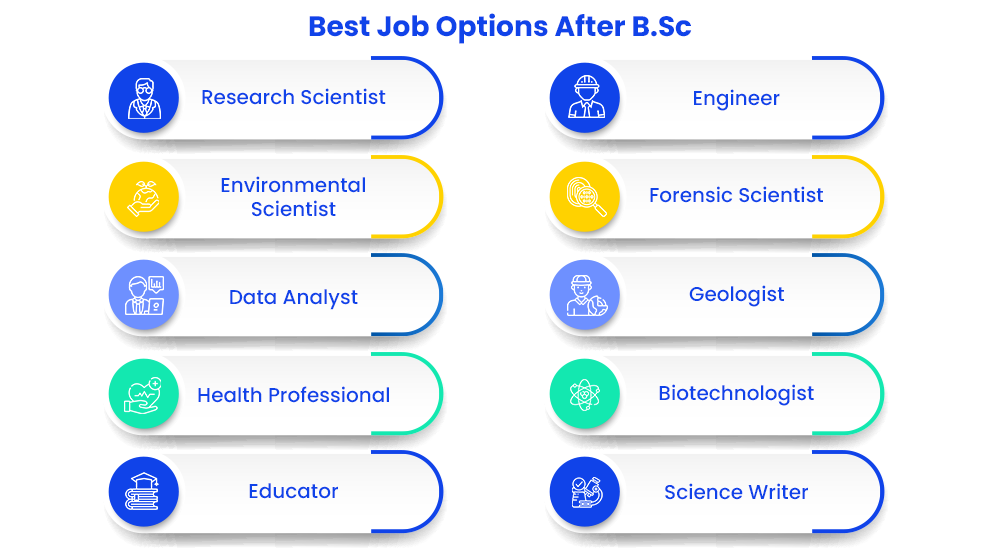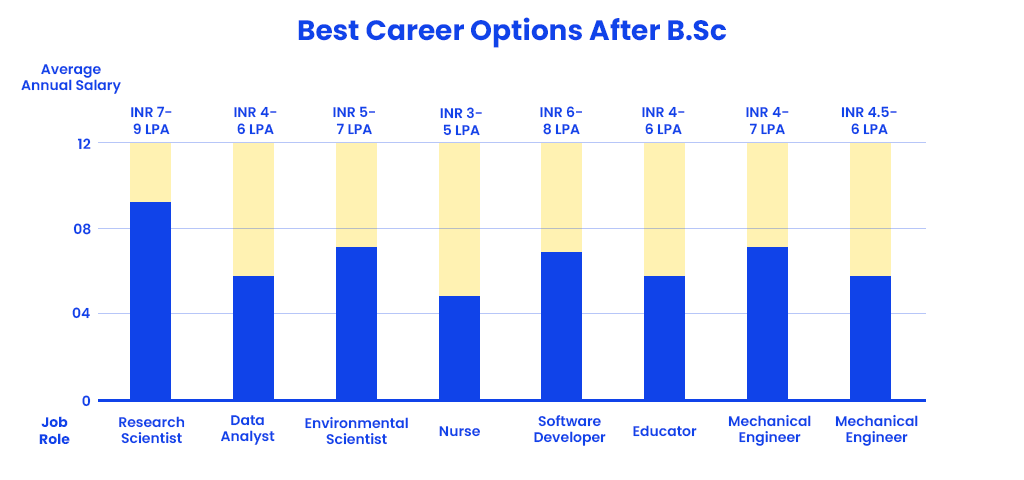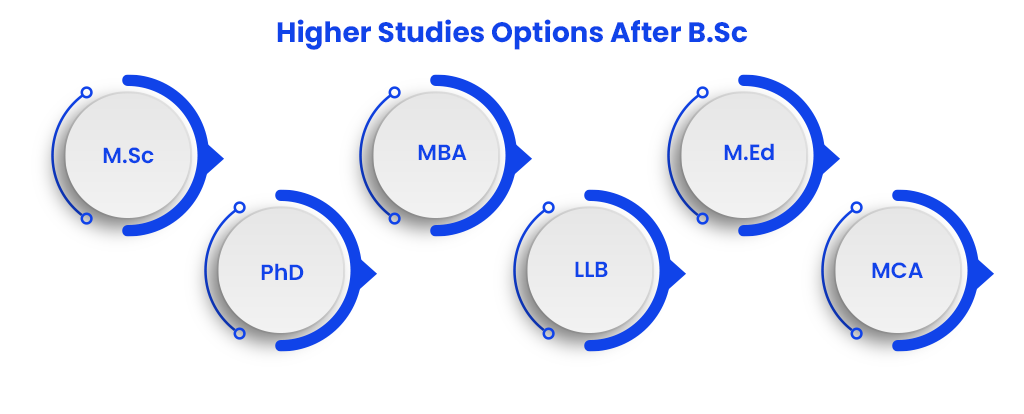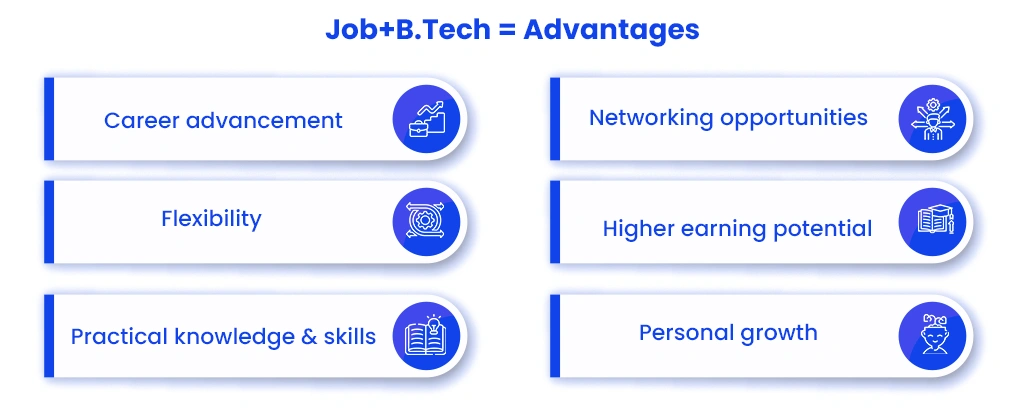Expert Interviews
- University Reviews
- Career Guide
 Video Counseling
Video CounselingImportant Facts
- Ask any Question - CV Forum

Best Career Options After B.Sc: Courses, Jobs, Salary 2024
College Vidya Dec 11, 2023 4.2K Reads
Bachelor of Science (B.Sc) is a 3-year undergraduate program in the field of Science. The students who have passed their 10+2 in the Science stream can pursue this course. There are several specialisations in which B.Sc can be pursued including Physics, Chemistry, Biology, Computer Science, Geology, Botany, and other related science subjects.
This blog will update you with the knowledge of all forms of career opportunities that are available to a student who has completed their graduation in B.Sc. First option is that you get a job in your field of expertise after B.Sc. The second option is to pursue higher education to gain more knowledge in the field. The last but definitely not the least option is a wise one which says that after completing your B.Sc you could pursue a job and a higher level degree at the same time. We will be discussing these options in great detail further in the blog.
If you have pursued B.Sc, then a career after B.Sc can be quite fruitful for growth in the field of Science and Technology. This undergraduate degree of science opens doors to several career opportunities in diverse fields in the domain of science.
A B.Sc program strongly focuses on theoretical as well as practical aspects of the chosen science specialisation. The aim of this undergraduate degree is to build a strong foundation of the fundamentals of science within individuals. Apart from theoretical coursework and practical learning, the course curriculum also includes research-based projects for students to gain in-depth knowledge of the subject.
BSc degrees are highly valued by employers and can lead to a wide range of career opportunities in fields such as research, engineering, healthcare, teaching, and more. Many students also choose to pursue further studies such as master's and doctoral degrees after completing their BSc program.
Career Opportunities After B.Sc (Jobs)
B.Sc is an undergraduate degree that covers almost all of the major fields in Science. This is why BSc graduates can pursue a wide range of career opportunities across various fields. Some of the most popular career paths for BSc graduates include:
- Research Scientist: BSc graduates in fields such as biology, chemistry, physics, or computer science can pursue a career in research, working in industries such as pharmaceuticals, biotechnology, or healthcare.
- Data Analyst: BSc graduates in fields such as mathematics, statistics, or computer science can become data analysts, working in industries such as finance, marketing, or technology.
- Environmental Scientist: BSc graduates in environmental science can work in fields such as sustainability, conservation, or environmental consulting.
- Health Professional: BSc graduates in healthcare-related fields such as nursing, pharmacy, or physical therapy can become health professionals, working in hospitals, clinics, or other healthcare facilities.
- Educator: BSc graduates can become science educators, teaching at the high school or college level.
- Engineer: BSc graduates in engineering fields such as civil, mechanical, electrical, or computer engineering can pursue careers in various industries such as manufacturing, construction, or technology.
- Forensic Scientist: BSc graduates in forensic science can work in fields such as law enforcement or the criminal justice system.
- Geologist: BSc graduates in geology can pursue careers in the energy, mining, or environmental industries.
- Biotechnologist: BSc graduates in biotechnology can work in fields such as genetics, biomanufacturing, or research and development.
- Science Writer: BSc graduates with strong writing and communication skills can become science writers, working in journalism, publishing, or communications.
Overall, a BSc degree can provide a strong foundation for a wide range of career opportunities, depending on the field of study and the skills and knowledge acquired during the program.
Salary & Job Roles After B.Sc
The following table lists a few of the many job roles that a B.Sc graduate might be eligible for, depending on their specialisation and field of expertise. The table also lists the role of a particular job and their average base salary respectively.

|
Job Role |
Job Description |
Average Base Salary |
|
Research Scientist |
A research scientist typically works in industries such as pharmaceuticals, biotechnology, or healthcare. Their primary responsibilities include conducting research and developing new products, procedures, or treatments. They may work in fields such as genetics, immunology, or microbiology. |
INR 7-9 LPA |
|
Data Analyst |
A data analyst is responsible for collecting, processing, and analysing data to identify patterns, trends, and insights. They may work in industries such as finance, marketing, or technology. |
INR 4-6 LPA |
|
Environmental Scientist |
An environmental scientist is responsible for studying the environment and its impact on living organisms. They may work in fields such as conservation, sustainability, or environmental consulting. |
INR 5-7 LPA |
|
Nurse |
A nurse is responsible for providing direct patient care in hospitals, clinics, or other healthcare facilities. They may work in fields such as paediatrics, geriatrics, or critical care. |
INR 3-5 LPA |
|
Software Developer |
A software developer is responsible for designing, developing, and testing computer software. They may work in fields such as mobile app development, gaming, or cybersecurity. |
INR 6-8 LPA |
|
Educator |
An educator is responsible for teaching science to students at the high school or college level. They may work in fields such as biology, chemistry, or physics. |
INR 4-6 LPA |
|
Mechanical Engineer |
A mechanical engineer is responsible for designing, developing, and testing mechanical devices such as engines, machines, or equipment. They may work in fields such as manufacturing, construction, or aerospace. |
INR 4-7 LPA |
|
Forensic Scientist |
A forensic scientist is responsible for analysing physical evidence to solve crimes. They may work in fields such as law enforcement, criminal justice, or private investigation. |
INR 4.5-6 LPA |
|
Biotechnologist |
A biotechnologist is responsible for developing new products or technologies using living organisms or biological processes. They may work in fields such as genetics, biomanufacturing, or biopharmaceuticals. |
INR 5-7 LPA |
|
Science Writer |
A science writer is responsible for writing and communicating about science to a wider audience. They may work in fields such as journalism, publishing, or communications. |
INR 5-7 LPA |
Future Scope For B.Sc Graduates
The future scope for BSc graduates is quite promising, as they are in demand in various industries and fields. Here are some reasons why BSc graduates have a bright future:
- Increasing demand for science professionals: With advancements in technology and the growing need for scientific solutions, there is a growing demand for science professionals across various fields.
- Diverse career opportunities: BSc graduates have a wide range of career opportunities in various fields such as healthcare, biotechnology, research, engineering, and environmental science.
- Flexibility in choosing further studies: BSc graduates can choose to pursue further studies such as an MSc, PhD, or professional courses like B.Ed, B.Lib.Sc, or LLB, which can further enhance their career prospects.
- High earning potential: Many science-related jobs offer high salaries and excellent benefits. With the right skills and experience, BSc graduates can earn a good income.
- Growing importance of data analysis: In today's data-driven world, data analysis skills are in high demand. BSc graduates with training in statistics, mathematics, or computer science can find many job opportunities in this field.
- Opportunities for entrepreneurship: BSc graduates who are passionate about science can also start their own businesses in fields such as biotechnology, environmental science, or technology.
Overall, the future scope for BSc graduates is quite promising, and with the right skills and knowledge, they can build a successful and rewarding career.
Higher Education After B.Sc
After completing a BSc degree, there are several higher education options available for students to further enhance their knowledge and skills. Here are some of the most popular higher education options for BSc graduates:
- Master of Science (MSc): One of the most common options for BSc graduates is to pursue an MSc in their field of study. An MSc program provides in-depth knowledge and advanced training in a specific subject area and can open up many career opportunities.
- Master of Business Administration (MBA): An MBA degree is an excellent option for BSc graduates who want to pursue a career in management or business. It provides a broader understanding of business and management principles and can lead to higher-paying positions.
- Master of Education (MEd): BSc graduates who want to pursue a career in teaching can opt for an MEd degree. It provides the skills and knowledge needed to become a teacher or educational administrator.
- Doctor of Philosophy (PhD): BSc graduates who want to pursue a career in research or academia can opt for a PhD degree. It is a research-oriented program that provides advanced training in a specific subject area and prepares students for careers in research and teaching.
- Law (LLB): BSc graduates who want to pursue a career in law can opt for an LLB degree. It provides the skills and knowledge needed to become a lawyer or legal professional.
- Master of Computer Applications (MCA): For BSc graduates who want to pursue a career in the field of computer science, an MCA degree is an excellent option. It provides advanced training in computer science, programming, and software development.
Overall, there are many higher education options available for BSc graduates, and the choice depends on their interests, career goals, and skills.
Job + Higher Education After B.Sc
As mentioned earlier, once you have completed your B.Sc degree, you can look for a job. However, if you are not satisfied with the job and wish to upgrade your career opportunities, then you can pursue a higher degree as well and that too without leaving your job through Work Integrated Learning Programs (WILP). One of the best such courses is a B.Tech for working professionals program.
A B.Tech degree surely ensures a lucrative career as it will give you a boost. With both B.Sc and B.Tech degrees in hand, you will have a diverse pool of career options. There is a higher demand for engineers in various industries, making B.Tech graduates highly sought after.
The B.Tech for working professionals gives you an added advantage as it lets you continue with your job. This way you are getting to earn both theoretical knowledge and practical experience at the same moment, saving a lot of your precious time.
A B.Tech for working professionals program is a specialised degree program designed for individuals who are already employed and want to pursue a Bachelor of Technology (B.Tech) degree without disrupting their professional career. This program is also known as a part-time B.Tech or a B.Tech evening program.

The program is designed to be flexible and allows students to balance their work and studies. The courses are usually held in the evening or on weekends, allowing students to attend classes after work or on weekends.
The B.Tech for working professionals program covers the same curriculum as a regular B.Tech program, but the classes are scheduled in a way that is convenient for working professionals. The program typically takes longer to complete than a regular B.Tech program, as students attend fewer classes per week. However, since it is a B.Tech lateral entry program with admission directly to the second year of the program, the time is compensated as the students skip the entire first year.
The program is suitable for individuals who want to enhance their technical knowledge and skills and advance their careers in the engineering field. The program also provides an opportunity for individuals who could not pursue a B.Tech degree earlier due to various reasons to earn a degree and enhance their career prospects.
In summary, a B.Tech for working professionals program is an excellent option for individuals who want to earn a B.Tech degree without compromising their professional career and other commitments. It provides an opportunity to advance their technical knowledge and skills and enhance their career prospects in the engineering field.
Eligibility for B.Tech for Working Professionals
B.Tech for Working Professionals program is a specialised program for individuals with prior knowledge and some hands-on experience of the field. This course aims to enhance the knowledge and upgrade the experience of professionals working in the field of engineering.
Therefore, a B.Tech for working professionals program is actually a B.Tech lateral program which means that applicants are directly admitted to the second year. They can skip the entire first year of the program. However, they need to have the knowledge of subjects taught in the first year to be able to skip them.
So, the applicants must fulfil the following eligibility conditions to get admission to a B.Tech for Working Professionals program.
- The applicant must have pursued either a B.Sc degree or a 3-year polytechnic diploma in a relevant specialisation.
- The applicant must have earned their last qualification from a recognised and approved institution.
- The applicant must have secured a minimum of 50% marks in aggregate.
- People with relevant work experience of at least 1-2 years are usually preferred.
Benefits of B.Tech for Working Professionals
B.Tech for Working Professionals has many advantages other than the one which says that you get to study and work at the same time. The other advantages together make this course one of the most sought after because it prepares you according to the demands and competition of the job market helping you get the best out of your career.
- Career advancement: A B.Tech degree can help working professionals enhance their technical skills and knowledge, which can lead to better job opportunities and career growth.
- Flexibility: B.Tech for working professionals programs are designed to cater to the needs of working professionals, offering classes in the evenings or on weekends, allowing them to continue their jobs while pursuing a degree.
- Practical knowledge and skills: B.Tech programs focus on practical knowledge and skills, which can be directly applied to the workplace. This can help working professionals become more effective in their current roles.
- Networking opportunities: B.Tech programs provide opportunities to network with other professionals in the field, which can lead to valuable connections and opportunities.
- Higher earning potential: A B.Tech degree can lead to higher salaries and better job opportunities, which can result in higher earning potential for working professionals.
- Personal growth: Pursuing a B.Tech degree can provide a sense of personal achievement and growth, which can be highly fulfilling for working professionals.
In summary, a B.Tech for working professionals program offers several benefits for individuals who want to enhance their technical knowledge and skills while continuing their professional careers. It can lead to better job opportunities, higher earning potential, and personal growth, while offering flexibility and practical knowledge and skills.
Popular B.Tech Specialisations for Working Professionals
Some of the top B.Tech specialisations for working professionals include:
- Computer Science Engineering
- Civil Engineering
- Electronics & Communications Engineering
- Electrical Engineering
- Mechanical Engineering
Career After B.Tech for Working Professionals
You now already know the career benefits of pursuing a B.Tech for working professionals program. So, if you are planning to pursue the course, then you can take a look at the prospective job roles that are out there for you. The role will depend on the specialisation you choose to pursue in your B.Tech program.
Following are only some of the popular job roles along with their average base salaries for your reference.
|
Job Role |
Average Base Salary |
|
Software Engineer/Developer |
INR 5-7 LPA |
|
Network Engineer/Developer |
INR 4-6 LPA |
|
Civil Engineer |
INR 4-7 LPA |
|
Mechanical Engineer |
INR 4-7 LPA |
|
Electrical Engineer |
INR 4-7 LPA |
Summary
B.Sc is an undergraduate program which offers a lot of options for you in your career. You can immediately start with a job after your graduation or you can decide to pursue further education. One of the best and most feasible options is to pursue both a job and a higher education degree with the help of the work integrated learning program (WILP) of B.Tech for working professionals.
Additionally, if you are a working professional in the science or engineering field, pursuing an B.Tech for working professionals degree can help you advance your career. However, it is crucial to choose an approved university to ensure that your degree is valid. Be cautious of fake universities that make false promises. You can find a list of approved universities offering B.Tech for working professionals programs on College Vidya. The platform provides detailed information about the universities and courses to help you make an informed decision.
FAQs (Frequently Asked Questions)
A career after B.Sc can be very fulfilling, with many opportunities for growth and advancement. The degree is quite rewarding as it opens up many opportunities in various fields.
Some of the popular job roles available for B.Sc graduates include research scientist, engineer, data analyst, science writer, forensic scientist, educator, health professional, geologist, and more.
BSc degrees are highly valued by employers and can lead to a wide range of career opportunities in fields such as research, engineering, healthcare, teaching, and more. First option is that you get a job in your field of expertise after B.Sc. The second option is to pursue higher education to gain more knowledge in the field. The last but definitely not the least option is a wise one which says that after completing your B.Sc you could pursue a job and a higher level degree at the same time.
Both B.Sc and B.Tech are postgraduate degrees that offer excellent career prospects. However, they are different programs and the choice between them should be based on your career goals and interests. If you are interested in a career in research or academia, then an B.Sc degree may be more suitable. On the other hand, if you are interested in a career in engineering, technology, or industry, then an B.Tech degree may be more appropriate.
The future scope for BSc graduates is quite promising, as they are in demand in various industries and fields. Some reasons why BSc graduates have a bright future include Increasing demand for science professionals, Diverse career opportunities, Flexibility in choosing further studies, High earning potential, growing importance of data analysis, and Opportunities for entrepreneurship.
Yes, through the B.Tech for working professionals degree, you can pursue both higher studies and your job together. B.Tech for working professionals is an AICTE approved work integrated learning program (WILP) and is valid if pursued from a recognised university.

Idea Alchemist / Concept Creator / Insight Generator
We are an online education platform where users can compare 100+ online universities on 30+ X-factors in just 2 minutes. With an active CV community, we have transformed online learning to quite an extent. With the CV Subsidy scheme, we contributing to GER in India while helping our learners with their finances in their “Chuno Apna Sahi” journey!
Every query is essential.
Our team of experts, or experienced individuals, will answer it within 24 hours.
Recommended for you
Tired of dealing with call centers!
Get a professional advisor for Career!
LIFETIME FREE
Rs.1499(Exclusive offer for today)

Pooja
MBA 7 yrs exp

Sarthak
M.Com 4 yrs exp

Kapil Gupta
MCA 5 yrs exp
or



